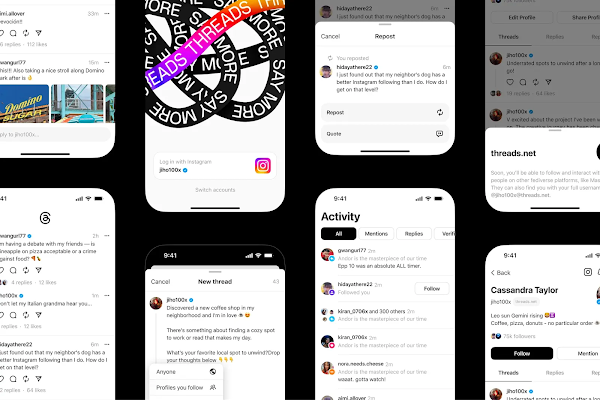Sources close to Meta said that the tech giant has refrained from rolling the service out in the EU because of what the company believes is a lack of clarity contained in the EU’s Digital Markets Act. Under the Act, companies such as Meta become “gatekeepers”, with restrictions on how they mingle users’ personal data.
The new Threads platform is designed to import data from Instagram, including behavioural and advertising information.
In its US format, the platform tells users that it will collect a wide variety of data from users, including health, financial information, browsing histories, location, purchases, contacts, search history and sensitive information.
In the EU, Meta has been prevented from launching advertising services on Whatsapp that uses data from Facebook or Instagram. The tech giant is allowed to mingle the two data streams in the US, which has weaker privacy laws.
Adrian Weckler
As expected, Meta’s Twitter replica launched last week to a fulminant start, reaching 70 million signups in a single day (although 95 million posts and 190 million likes as it reached 30 million sign-ups doesn’t seem that impressive when you consider it translates into an average of 3 posts and 6 likes per user). A less expected aspect of this launch: how the app was missing for the entire European Union…
I was somewhat excited to try out Threads, although that excitement has since subsided – posts (threads?) are openly available on the web without logging in, so I don’t feel I’m missing that much not being able to contribute myself. And I would rather not give Meta access to more personal data if I can help it…

Their reluctance to launch in the EU is remarkable though. Maybe it’s for the right reasons, meaning more time to vet the data sharing between their various apps to properly comply with the upcoming Digital Markets Act. I’m not necessarily suggesting they would plan something nefarious with the collected data, but at a company of Meta’s size systems become so complex that it’s nigh impossible to rule out unintended data leaks. Meta was recently handed a resounding defeat at the CJEU, which ruled Meta’s GDPR approach illegal, so it would certainly make sense to handle matters more prudently going forward. Tech companies rolling out apps and features more slowly while reviewing their implications could be a welcomed sign that privacy legislation in the EU is having its intended effect.
But it’s possible that Meta may be using this delayed start as a bargaining chip with regulators, to try to squeeze out concessions by pointing to public interest in the product – as it has happened with regulations around news in Australia and Canada. Hopefully they won’t succeed if that’s the case – a copycat Twitter doesn’t realty seem worth it to water down privacy protections.
Another amusing side to this privacy story is that Meta had no qualms launching this product in the AppStore, despite Apple’s proclaimed stance on tracking. Almost as if their AppStore rules are only performatively about people’s privacy, when in fact they don’t offer any protection and companies can sidestep them at will, as long as Apple gets traffic or their respective cut from in-app purchases.
For Android users, the Google Play Store doesn’t require you to hand over the same amount of extensive data to try out Threads. You have more control than Apple users, since you can granularly toggle what personal data is shared with apps.
Reece Rogers
Threads launched also sans the ActivityPub integration that was the focus of heated debate in the Fediverse before. It will be interesting to watch when and how it will be rolled out, or better said, if Meta ever gets around to implement this, as I don’t get the impression that interoperability and data portability are high on their list of priorities. So, which will come first? An EU-ready version of Threads, or ActivityPub compatibility? My money is on an EU launch, since that has the potential to make Meta money, even with less potent ad targeting options.
Post a Comment